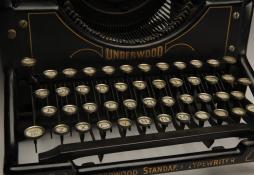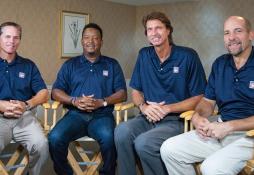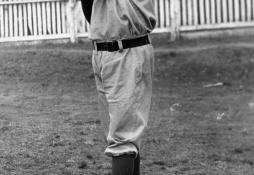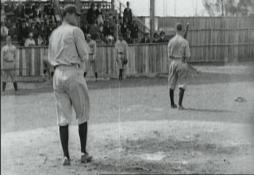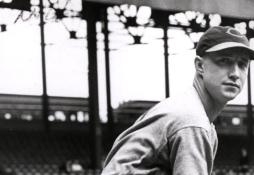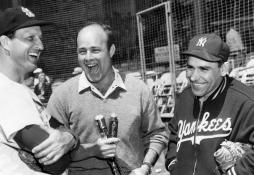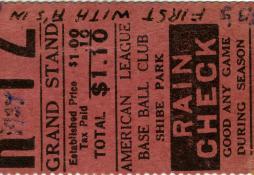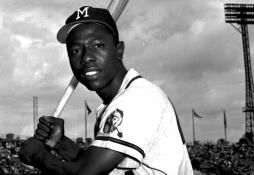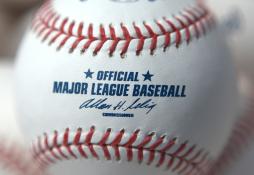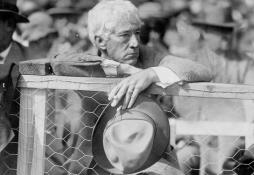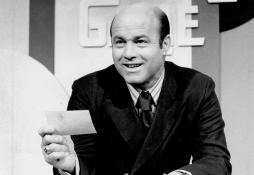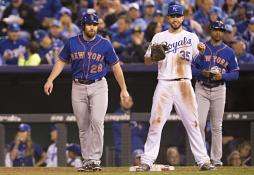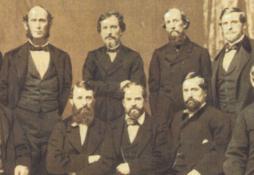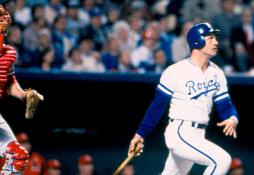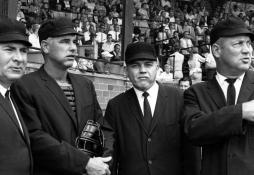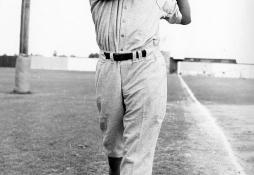- Home
- Our Stories
- Ten Named To Pre-Integration Era Ballot for Baseball Hall of Fame Election
Ten Named To Pre-Integration Era Ballot for Baseball Hall of Fame Election
Six former big league players, three executives and one of the game’s earliest organizers comprise the 10-name Pre-Integration Era ballot to be reviewed and voted upon Dec. 7 at the Baseball Winter Meetings in Nashville, Tenn., the National Baseball Hall of Fame and Museum announced today.
Doc Adams, Sam Breadon, Bill Dahlen, Wes Ferrell, Garry Herrmann, Marty Marion, Frank McCormick, Harry Stovey, Chris von der Ahe and Bucky Walters are the candidates for Pre-Integration Era Committee consideration for Hall of Fame election for the Class of 2016. Dahlen, Ferrell, Marion, McCormick, Stovey and Walters are included for their contributions as players, while the other four are inclusions for their off-field careers. All candidates are deceased.
Any candidate to receive votes on 75 percent of the ballots cast by the 16-member Pre-Integration Era Committee will earn election to the National Baseball Hall of Fame and will be inducted in Cooperstown on July 24, 2016, along with any electees who emerge from the 2016 Baseball Writers’ Association of America election, to be announced on Jan. 6, 2016.
The 10 Pre-Integration Era finalists were selected by the BBWAA-appointed Historical Overview Committee from all eligible candidates among Managers, Umpires, Executives and Long-Retired Players whose most significant career impact was realized during the time period from baseball’s origins through 1946. Eligible candidates include: Players who played in at least 10 major league seasons, who are not on Major League Baseball’s ineligible list, and have been retired for 21 or more seasons; and Managers, Umpires and Executives with 10 or more years in baseball.
Adams, Herrmann, McCormick, von der Ahe and Stovey are new additions for consideration by the Pre-Integration Era Committee, which elected Hank O’Day, Jacob Ruppert and Deacon White in December 2012, the last time the Pre-Integration Era Ballot was considered. Tony Mullane and Alfred Reach were previously considered for election in the fall of 2012 but did not return to the 2016 Pre-Integration Era ballot.
The Pre-Integration Era ballot was determined this fall by the Historical Overview Committee, comprised of 11 veteran historians: Dave Van Dyck (Chicago Tribune); Bob Elliott (Toronto Sun); Jim Henneman (formerly Baltimore Sun); Rick Hummel (St. Louis Post-Dispatch); Steve Hirdt (Elias Sports Bureau); Bill Madden (formerly New York Daily News); Jack O’Connell (BBWAA secretary/treasurer); Jim Reeves (formerly Fort Worth Star-Telegram); Tracy Ringolsby (MLB.com); Glenn Schwarz (formerly San Francisco Chronicle); and Mark Whicker (Los Angeles News Group).
The 16-member Hall of Fame Board-appointed electorate charged with the review of the Pre-Integration Era ballot will be announced later this fall. The Pre-Integration Era electorate will meet to discuss and review the candidacies of the 10 finalists as part of baseball’s Winter Meetings, December 6-7 in Nashville.
The Candidates
Doc Adams was a talented player in baseball’s earliest days who became a pioneering force on a multitude of fronts in baseball’s nascent years. Adams, who became a member of the famed Knickerbocker Base Ball Club in 1845, helped standardize the game’s tools and contributed to the establishment of the shortstop position.
Sam Breadon purchased interest in the St. Louis Cardinals in 1917 and took control of the club in 1920. Breadon hired Branch Rickey and created the blueprint for the modern farm system with minor league clubs owned or controlled by the parent club. He presided over nine pennant winners and six World Series championships, include the Gashouse Gang teams of the 1930s and the dynasty teams of the 1940s. During his tenure as principle owner, the Cardinals posted a 2,470-1,830 record, good for a .574 winning percentage.
Bill Dahlen spent 21 seasons in the majors from 1891-1911, playing almost 90 percent of his games at shortstop, compiling a .272 batting average with 84 home runs and 1,234 RBI. He scored 100 or more runs in each of his first six seasons and recorded 120 hits or more 15 times. He retired in 1911 as the active home run leader with 84 and as the all-time leader in games played (2,444).
Wes Ferrell pitched for 15 seasons from 1927-1941, compiling a 193-128 record with a 4.04 career ERA. Won at least 20 games six times and is the only pitcher from the 20th century to win at least 20 games in each of first four full big league seasons. He led the league in complete games four times and was runner-up for the American League MVP in 1935.
August “Garry” Herrmann served as president of the Cincinnati Reds from 1902 to 1927 and chairman of baseball’s ruling National Commission from 1903 to 1920. He helped to broker peace between the warring National and American Leagues in the first decade of the 20th century and helped organize the modern World Series.
Marty Marion spent 13 seasons in the majors, 1940-50, 1952-53, batting .263 with 36 home runs and 624 RBI at shortstop. Was named the 1944 N.L. MVP Award winner, twice also finishing in the top 10. Considered one of the best fielding shortstops of his era.
Frank McCormick was an eight-time All-Star and the 1940 National League Most Valuable Player. A slick-fielding first baseman who led the National League in hits three straight years from 1938 through 1940, McCormick compiled a career batting average of .299 in 13 big league seasons.
Chris von der Ahe owned the original St. Louis Browns franchise – now the Cardinals – from 1881 through 1899 and demonstrated his visionary qualities with entertainment options at games. His team won the championship of the American Association – then recognized as a major league – from 1885 through 1888, teams that featured future Hall of Famers Charlie Comiskey and Tommy McCarthy.
Harry Stovey was a standout outfielder in the National League and the American Association in the 1880s and 1890s, leading his league in home runs five times and runs scored four times. In 14 seasons, Stovey batted .289 with 347 doubles, 174 home runs and 509 stolen bases.
Bucky Walters pitched 19 seasons in the major leagues, from 1934-1950, compiling a 198-160 lifetime record, with a 3.30 era in 428 games/398 starts. He won the 1939 NL MVP Award, posting a 27-11 record, with a 2.29 ERA, winning the pitching Triple Crown with 137 strikeouts. Named to five All-Star teams, Walters converted to a pitcher from an infielder following his first four seasons in the majors from 1931-34.
Click here for more information on each candidate.
Hank O’Day, Jacob Ruppert and Deacon White were elected by the Pre-Integration Era Committee in 2012: Jacob Ruppert (15 votes, 93.8%); Hank O’Day (15 votes, 93.8%); Deacon White (14 votes, 87.5%); Bill Dahlen (10 votes, 62.5%); Sam Breadon, Wes Ferrell, Marty Marion, Tony Mullane, Alfred Reach and Bucky Walters each received three votes or less.
About the Eras Committees
The Pre-Integration Era Committee is the third of a three-year cycle of consideration for Managers, Umpires, Executives and Long-Retired Players by Era, as opposed to the previous consideration by classification, with changes approved and announced by the Hall of Fame’s Board of Directors in 2010. The 2015 meeting will mark the second time candidates from the Pre-Integration Era have been considered by a committee system. Both the ballot and electorate are created anew with each cycle for consideration.
The Era Committees maintain the high standards for earning election to the National Baseball Hall of Fame, with focus on three time periods: Expansion (1973-present); Golden (1947-1972) and Pre-Integration (1871-1946), as opposed to the previous four Committees on Baseball Veterans, which considered the four categories of candidates. Three separate electorates consider by eras a single composite ballot of managers, umpires, executives and long-retired players on an annual basis, with Expansion Era Committee candidates to be considered at the 2016 Winter Meetings for Induction in 2017 and the Golden Era Committee candidates to be considered again at the 2017 Winter Meetings for Induction in 2018. The Pre-Integration Era Committee will next meet at the 2018 Winter Meetings for Induction in 2019.
Candidates remain eligible in perpetuity through the Era Committee process, with new ballots constructed by the Historical Overview Committee the fall prior to each election.

